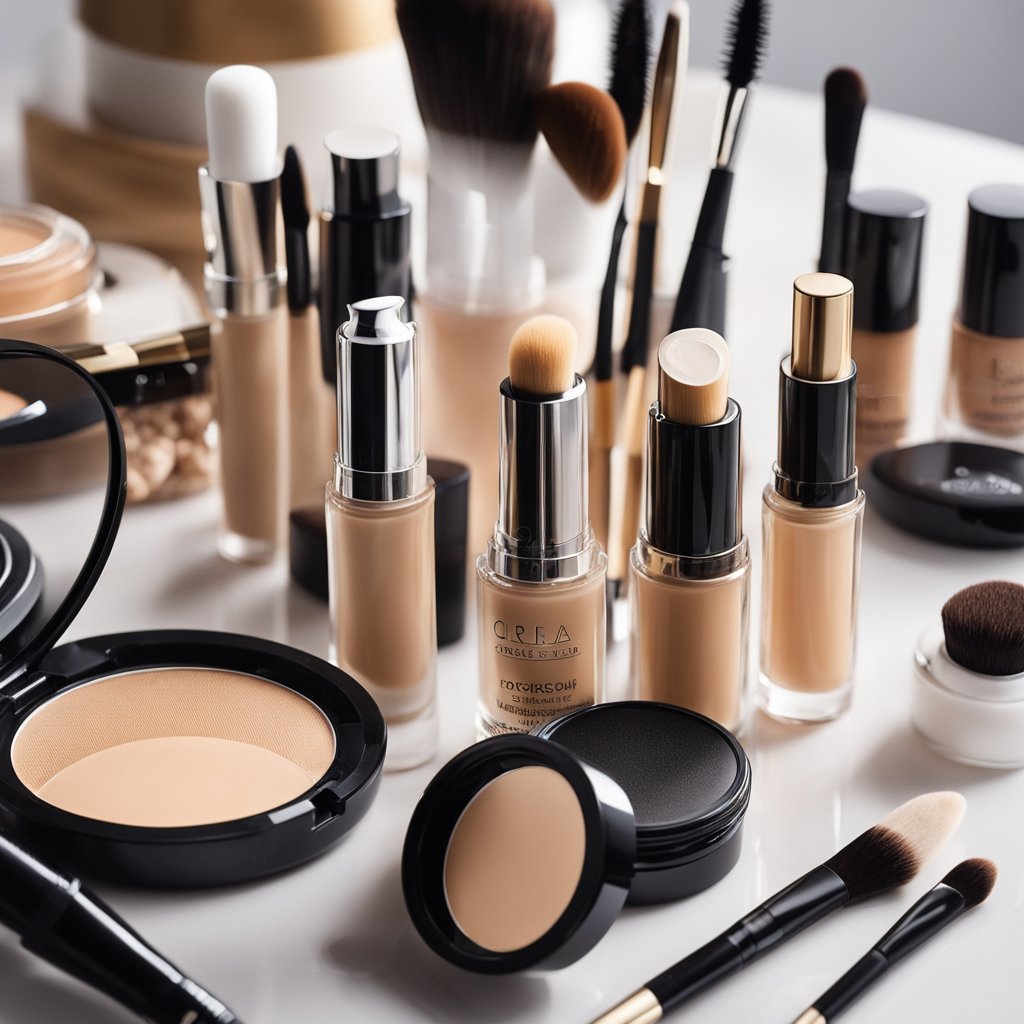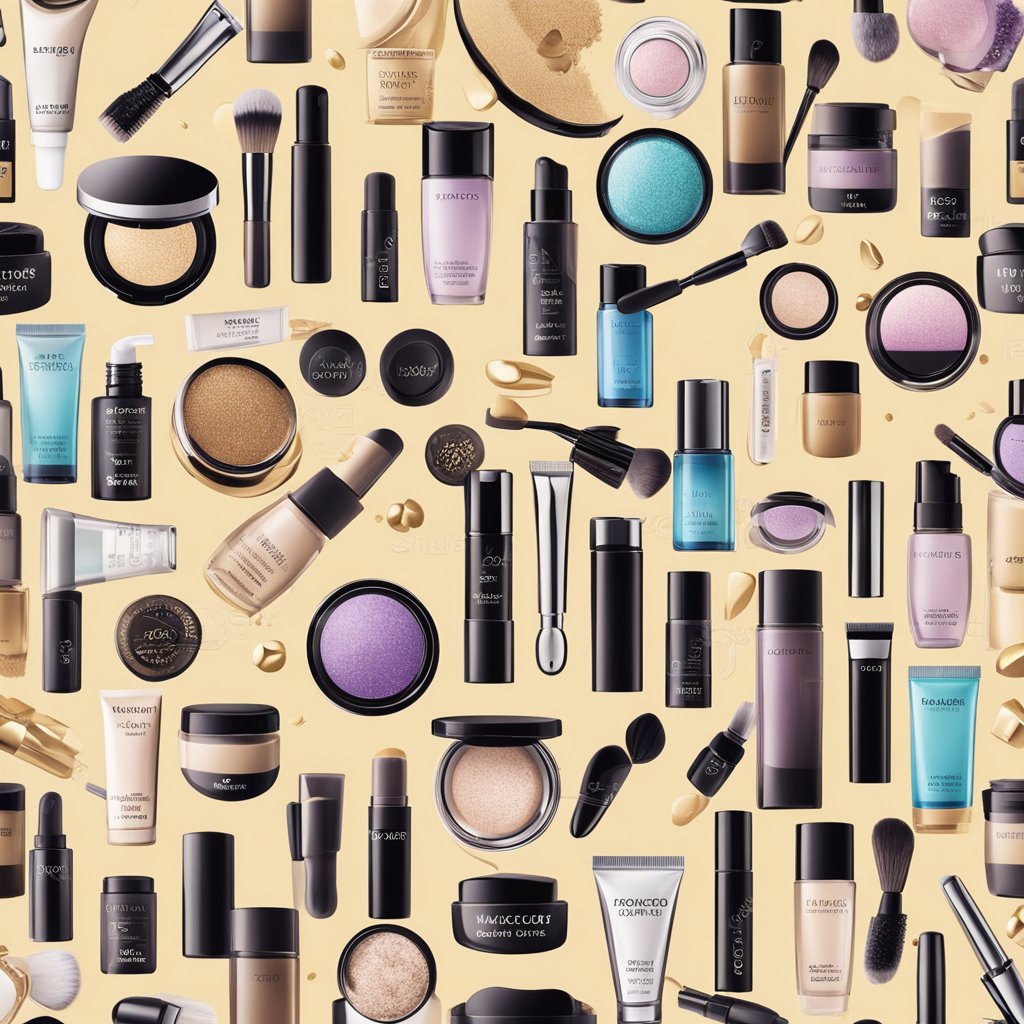Acne is a common concern for many, and finding makeup that can effectively cover blemishes without exacerbating the condition is a challenge I’m well aware of. The goal is to achieve a look that not only conceals acne but also promotes skin health. With the myriad of makeup products on the market, it can be overwhelming to select those that offer the best coverage while being gentle on the skin.

My skincare journey has taught me that understanding the interaction between makeup and acne-prone skin is key. I’ve learned that selecting non-comedogenic products, which do not clog pores, is essential. Additionally, applying makeup with techniques that prevent further irritation is just as important as the makeup itself. It’s clear that achieving a flawless finish over acne requires a combination of the right products and skillful application.
Maintaining a healthy skincare routine also plays a fundamental role in managing acne. While makeup can effectively cover up blemishes, it’s imperative to enhance skin health with a routine tailored to acne-prone skin. This involves gentle cleansing, appropriate moisturizing, and using treatments that target acne without stripping the skin of its natural oils. With the correct approach, makeup can be a powerful ally in concealing acne, all while fostering healthier skin beneath.
Key Takeaways
- Selecting non-comedogenic makeup is crucial for covering acne without clogging pores.
- Skillful application using the right techniques, like a beauty blender, can provide a smooth, flawless finish.
- A consistent skincare routine complements makeup use and promotes overall skin health.
Understanding Acne and Makeup Interaction

I will guide you through how certain makeup ingredients can affect acne-prone skin and the importance of choosing non-comedogenic products.
Impact of Ingredients on Acne-Prone Skin
Sensitive skin or those prone to acne should pay close attention to makeup ingredients. Some ingredients are liable to exacerbate acne. For instance:
- Oils: Certain oils in makeup can clog pores, leading to increased acne. However, not all oils are bad; non-comedogenic oils, like sunflower oil, don’t clog pores.
- Bacteria: Makeup can harbor bacteria, which can infect clogged pores and worsen acne.
- Alcohol-based ingredients: These can be drying and irritating, potentially leading to more breakouts in sensitive skin.
Ensure you check makeup labels for specific ingredients that may cause issues for your skin type.
The Role of Non-Comedogenic Products
Products labeled as non-comedogenic are formulated to minimize the risk of clogged pores, a significant concern for acne-prone skin. They tend to avoid ingredients known to clog pores, like certain oils and silicones. By using non-comedogenic makeup, I can minimize acne flare-ups and maintain clearer skin. Remember, the term “non-comedogenic” can vary by brand, so it’s crucial to monitor how your skin reacts to different products.
Choosing the Right Makeup Products
When I select makeup for acne-prone skin, my focus is on finding products that offer effective coverage without aggravating the skin. The goal is to achieve a smooth, flawless finish while concealing any redness and blemishes with products specifically designed for this purpose.
Finding the Best Foundations for Acne Coverage
When I look for a foundation that covers acne, oil-free options are my first choice. These foundations prevent additional oil from clogging pores, a common concern for acne-prone skin. Liquid foundation is popular for its ease of application and ability to provide a buildable coverage, which means you can apply layers to achieve the desired effect without the makeup appearing too heavy or cakey. One of the best foundations I’ve found for acne coverage includes a powder foundation; its lightweight formula minimizes oil and offers a natural matte finish.
- Oil-free Liquid Foundations:
- Provides natural-looking coverage
- Buildable from medium to full coverage
- Powder Foundations:
- Ideal for oily skin types
- Mattifying effect with lightweight feel
Top Concealers for Camouflaging Blemishes
For targeting specific areas, a high-quality concealer is indispensable. I always reach for concealers packed with pigment because they provide the high coverage needed to conceal blemishes effectively. The best concealers for acne will not only hide redness and blemishes but also blend seamlessly with the rest of your makeup. Look for products labeled as non-comedogenic to ensure they won’t block your pores. I recommend using a concealer with a pointed or precision tip applicator for accurate application on individual blemishes.
-
High Coverage Concealers:
Qualities Benefits Packed with Pigment Ensures efficient coverage Non-comedogenic Won’t clog pores Precision Tip Applicator Allows for targeted application
Application Techniques for a Flawless Finish
I’ve spent considerable time researching and mastering application methods to reliably cover acne for a smooth, long-lasting finish. Here I will share specifics on blending and setting so that you can achieve a flawless look.
Mastering the Art of Blending
To conceal acne effectively, start with a primer that suits your skin type; this provides a smooth canvas. I apply a buildable coverage foundation using clean brushes or damp sponges, carefully stippling onto each pimple to avoid aggravating the skin. After applying in thin layers, I focus on blending the edges to create a seamless transition between the product and my skin. The key is to be gentle and patient; harsh rubbing can cause irritation and diminish coverage.
Maximizing Longevity with Setting Products
Once the foundation is blended, I ensure longevity by using a setting powder. Applying a light dusting specifically helps control shine and secures the foundation. For areas with pronounced acne, I press the powder in with a puff to set the foundation without disturbing the layer underneath. To complete the process, a mist of setting spray helps lock everything in place and provides additional hydration, which can prevent the makeup from caking. The overall finish remains fresh throughout the day when I take these steps.
- Application tools: Opt for brushes with dense bristles or use sponges for stippling and blending.
- Layering: Apply foundation in thin layers for medium coverage that can be built up without feeling heavy.
- Setting: Invest in translucent powders and sprays that won’t alter the color of your foundation.
Enhancing Skin Health Alongside Makeup Use
When covering acne with makeup, it’s essential to incorporate products that also support skin health. My approach ensures that makeup application not only conceals breakouts but also contributes to the overall treatment of acne.
Incorporating Acne-Fighting Skincare Ingredients
Salicylic acid is a cornerstone ingredient for acne-prone skin. I recommend using a cleanser with salicylic acid to help exfoliate and penetrate pores, reducing breakouts. This should be the first step in any skincare routine before makeup application. Additionally, products labeled as “non-comedogenic” are preferable as they are less likely to cause acne.
-
Morning Routine:
- Cleanse with a salicylic acid-based cleanser
- Apply a hydrating, oil-free moisturizer
- Finish with an SPF product to protect the skin from sun damage, which can worsen acne scars.
-
Evening Routine:
- Remove makeup with micellar water; it’s gentle and effective
- Re-cleanse with the salicylic acid-based cleanser
- Use an acne treatment as prescribed by a dermatologist if needed.
Recommended Routines for Makeup Wearers
My approach involves a well-crafted skincare routine to prep the skin for makeup. This routine reduces the likelihood of aggravating acne and supports skin health.
Morning Prep:
- Start with the aforementioned cleanser
- Immediately after cleansing, apply a lightweight moisturizer to hydrate
Before Makeup:
- Wait for the moisturizer to be fully absorbed
- Apply a primer specifically formulated for acne-prone skin to create a barrier between the skin and makeup
Evening Unwind:
- Always remove makeup with micellar water before bed to let the skin breathe and repair overnight
By adhering to these routines, I support and enhance my skin’s health while using makeup to confidently cover acne.
Frequently Asked Questions
When dealing with acne-prone skin, the goal is to achieve a flawless finish without causing further irritation. I’ll guide you through some common concerns and share my insights on the best makeup options available.
What types of foundation are recommended for acne-prone skin?
For acne-prone skin, I recommend non-comedogenic foundations that are oil-free and formulated with ingredients like salicylic acid that can help prevent breakouts. Mineral foundations are also a great choice as they are gentle on the skin and provide natural coverage.
Which concealers provide the best coverage for acne scars and dark spots?
The best concealers for acne scars and dark spots tend to be highly pigmented and have a creamy, blendable texture that allows for buildable coverage. Look for products labeled as full-coverage that are also non-comedogenic to avoid clogging pores.
Are there any drugstore concealers that effectively cover acne scars and blemishes?
Yes, there are several drugstore concealers that offer good coverage for acne scars and blemishes. Quality drugstore concealers like Maybelline’s Fit Me Concealer or L’Oréal’s True Match concealer are affordable options that come in a variety of shades for precise skin tone matching.
How should makeup be applied to achieve the best coverage over acne scars on the face?
To achieve the best coverage over acne scars, use a clean makeup sponge or brush to gently apply foundation in a stippling motion, building coverage slowly. Follow with a concealer that matches your skin tone, applying it directly on scars and blending outwards.
Can you suggest makeup brands that are dermatologist-recommended for concealing acne?
Dermatologist-recommended makeup brands for concealing acne include Neutrogena, which offers a range of skin-clearing makeup, and Clinique’s Acne Solutions line. These brands are known for their non-irritating formulas that cover acne while being gentle on the skin.
What factors should be considered when choosing a makeup product for oily skin with acne scars?
When choosing makeup for oily skin with acne scars, consider products that are oil-free, have a matte finish, and offer long-lasting wear. Also look for makeup that contains acne-fighting ingredients and is designed to control shine throughout the day without clogging pores.